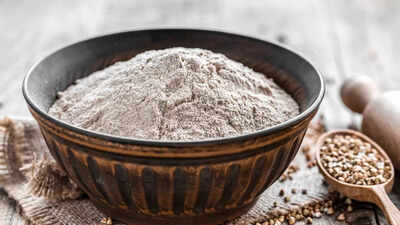ARTICLE AD BOX

Kuttu ka atta, widely used in India during fasting periods, is known in English as buckwheat flour. Despite the name, buckwheat is not related to wheat but comes from the seeds of the Fagopyrum esculentum plant.
Naturally gluten-free, it is an excellent choice for people with coeliac disease or gluten sensitivity. Buckwheat flour is rich in fibre, protein, magnesium, and antioxidants, making it a wholesome alternative to refined flours. It supports heart health, aids digestion, and helps regulate blood sugar levels. Its earthy flavour and versatility make it ideal for preparing chapatis, pancakes, noodles, and baked goods.
Nutritional profile of kuttu ka atta (Buckwheat Flour)
Buckwheat flour is packed with essential nutrients, including:
- Proteins: High-quality plant-based protein with all nine essential amino acids.
- Fibre: Supports digestion and gut health.
- Vitamins: Rich in B vitamins such as niacin, riboflavin, and folate.
- Minerals: Contains magnesium, manganese, copper, iron, phosphorus, and zinc.
- Antioxidants: Includes rutin and quercetin, which support heart and vascular health.
Kuttu ka atta (Buckwheat flour) supports heart health, manages blood sugar, and more
Kuttu ka atta, known in English as buckwheat flour, is not only a popular fasting staple in India but also a highly nutritious, heart-friendly ingredient. Scientific studies, including a systematic review published in PMC, highlight several key health benefits of incorporating buckwheat flour into your diet.1. Supports heart healthBuckwheat is rich in soluble fibre and bioactive compounds such as rutin, which help reduce total cholesterol and LDL cholesterol levels.
Regular consumption may lower the risk of cardiovascular disease and promote healthy arteries.2. Helps regulate blood pressureResearch indicates that buckwheat can contribute to a modest reduction in blood pressure, supporting overall cardiovascular wellness. Its combination of fibre, minerals, and antioxidants plays a role in maintaining vascular health.3. Rich in antioxidantsBuckwheat flour contains powerful antioxidants like rutin and quercetin, which protect cells from oxidative stress and inflammation.
These compounds can support long-term health, reduce the risk of chronic diseases, and improve overall immunity.4. Blood sugar managementWith a low glycaemic index, buckwheat helps stabilise blood sugar levels, making it an ideal choice for people with diabetes or those aiming to prevent blood sugar spikes. Its high fibre content further slows carbohydrate absorption, supporting metabolic health.5. Supports weight managementHigh in fibre and protein, buckwheat flour promotes satiety, which can help reduce overall calorie intake and aid in weight management.
Replacing refined flours with kuttu ka atta in meals like rotis, pancakes, or porridges can be a smart choice for those aiming to maintain or lose weight.6. Nutrient-rich profileApart from these benefits, buckwheat is packed with essential nutrients such as magnesium, manganese, phosphorus, and B vitamins. These nutrients contribute to bone health, energy metabolism, and overall wellbeing, making buckwheat flour a wholesome addition to any diet.
Side effects of kuttu ka atta (Buckwheat flour)
While kuttu ka atta offers many health benefits, it may not be suitable for everyone:1. Allergic reactionsSome people may develop buckwheat allergy, which can cause skin rashes, digestive discomfort, or, in rare cases, severe reactions.2. Excess fibre issuesConsuming large amounts of buckwheat flour may lead to bloating, gas, or stomach discomfort due to its high fibre content.3. Possible interference with medicationsBecause of its rutin content, buckwheat might interfere with blood-thinning medications. Those on anticoagulant therapy should consult a doctor before regular consumption.4. Overeating concerns during fastingBuckwheat flour is often consumed in fried foods like pooris and pakoras during fasting seasons. Eating it in excess or in fried form can add unnecessary calories and negate its health benefits.Disclaimer: This article is for informational purposes only and does not constitute medical advice. Always consult a qualified healthcare professional before making any changes to your health routine or treatment.



.png)
.png)
.png)
















 3 hours ago
3
3 hours ago
3









 English (US) ·
English (US) ·